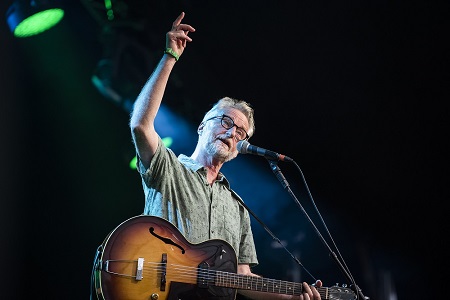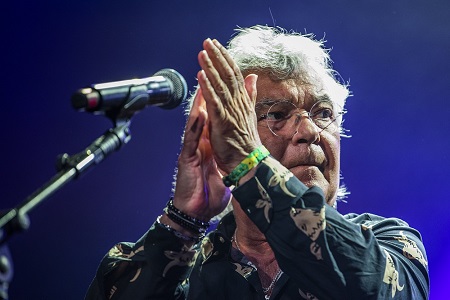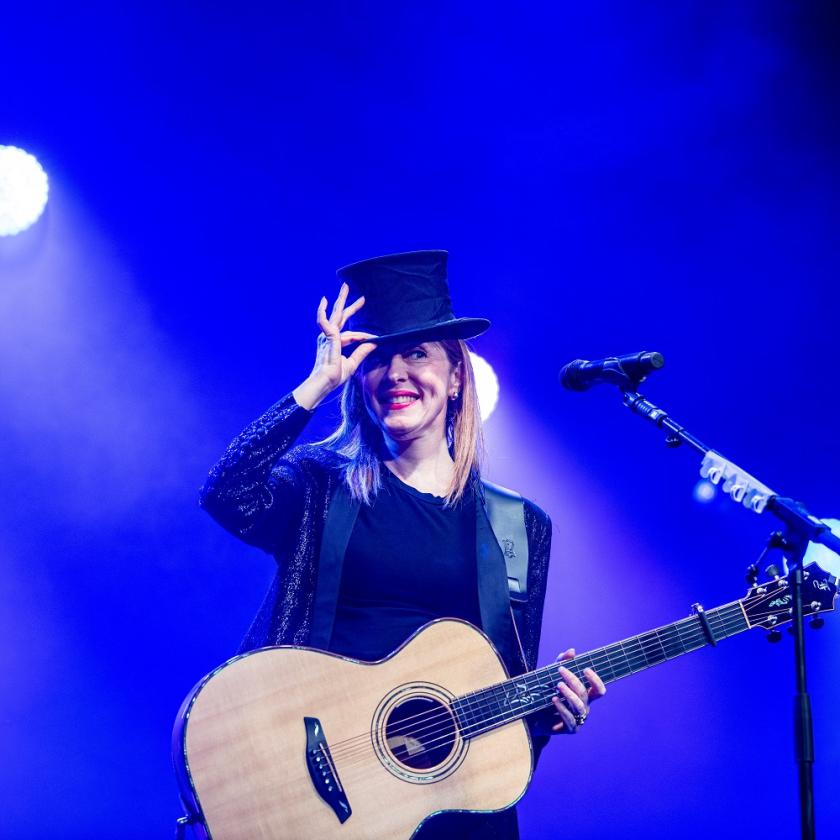On the last weekend of July, as they have every year since 1965, when an enlightened city council decided that Cambridge – like Newport, Rhode Island – would have a folk festival, thousands of people trekked to Cherry Hinton to enjoy what is now Britain’s premier folk event. One of the biggest in Europe and celebrated throughout the world, Cambridge is a calendar fixture and its return after the inevitable Covid absence was clearly very welcome.
Some 1,400 people came to that first festival, which featured the Clancy Brothers and Tommy Makem, Shirley Collins, Bob Davenport, Peggy Seeger, Hedy West, Isla Cameron, the Watersons and Paul Simon, a late addition to the bill. Now around ten times that number gather in the grounds of Cherry Hinton Hall, drawn this year by a rich and diverse programme that brought together performers from around the world, newbies and established artists, festival debuts and returnees, soloists and bands, each of whom find a place on one of the two big-tent stages, or in the Hub or the Den. It was in the Den that Angeline Morrison made her Cambridge debut, telling stories about brown people in folk music and singing to autoharp and Appalachian dulcimer. Remember her name.
 The music-making spills out into the vast campsites, and of course there’s singing workshops and much besides (knitting, for example) at this vast family-friendly festival. It’s also possible to buy an exquisite hand-crafted guitar or fiddle. While many people are constantly on the move, checking out events hither and yon, many more – perhaps the majority – settle themselves for the long weekend on folding chairs and rugs, reading the papers, doing a crossword, or snoozing in the sun as they watch Stage 1 on the big screen, stirring themselves only to recharge their glasses or partake of some high-quality festival food – or, of course, for a comfort break. Everything these days is thankfully more sophisticated but there’s no escaping the lines!
The music-making spills out into the vast campsites, and of course there’s singing workshops and much besides (knitting, for example) at this vast family-friendly festival. It’s also possible to buy an exquisite hand-crafted guitar or fiddle. While many people are constantly on the move, checking out events hither and yon, many more – perhaps the majority – settle themselves for the long weekend on folding chairs and rugs, reading the papers, doing a crossword, or snoozing in the sun as they watch Stage 1 on the big screen, stirring themselves only to recharge their glasses or partake of some high-quality festival food – or, of course, for a comfort break. Everything these days is thankfully more sophisticated but there’s no escaping the lines!
By early evening Friday, everyone was happily ensconced, many having enjoyed the traditional sounds of the Copper Family earlier in the day, or those perennial festival crowd-pleasers, Show of Hands, who popped up across the site throughout the weekend. But Friday belonged to Suzanne Vega, part of New York’s so-called Fast Folk movement in the 1980s (main picture). She and guitarist Gerry Leonard played an hour-long set that featured new and old songs, including the hits “Marlene On the Wall” (the top hat was in evidence, of course), “Luka”, her extraordinary song about child abuse, and “Tom’s Diner”. Lou Reed’s “Walk On the Wild Side” also got an outing – it was a 1979 concert by Reed that helped Vega find her voice and the two played a special concert in Prague for Vaclav Havel, Joan Baez and soprano Renee Fleming completing that extraordinary line-up.
Seasick Steve – his long white beard threatening to tangle in his guitar strings – ploughed his unique furrow, previewing tracks from his forthcoming album Only On Vinyl: “That’s its title and that’s how it is. You have to go to the record store.” Sadly “events” have delayed pressing and shipping and for Seasick Steve and others we will have to wait. Not good for artists who badly need to boost their post-Covid revenue in the merch tent.
 On Saturday, the sweet harmonies of Roswell were among the day’s gentle reveille in the Club Tent while, on the main stage, Welsh band VRi provided a more energetic awakening. They were followed by The Young ‘Uns, a very splendid trio from County Durham who mix sea shanties, narrative ballads, and topical songs – great harmonies and a big and exhilarating sound that, without looking, suggested a choir. They also had terrific stage presence. “Dark Water”, Sean Cooney’s song about the journey of Syrian refugee Hesham Modamani, was a highlight – sad, profound, beautifully sung. “The Day We Drank the Nazis Out of Town” was a witty and clever crowd-pleaser.
On Saturday, the sweet harmonies of Roswell were among the day’s gentle reveille in the Club Tent while, on the main stage, Welsh band VRi provided a more energetic awakening. They were followed by The Young ‘Uns, a very splendid trio from County Durham who mix sea shanties, narrative ballads, and topical songs – great harmonies and a big and exhilarating sound that, without looking, suggested a choir. They also had terrific stage presence. “Dark Water”, Sean Cooney’s song about the journey of Syrian refugee Hesham Modamani, was a highlight – sad, profound, beautifully sung. “The Day We Drank the Nazis Out of Town” was a witty and clever crowd-pleaser.
This Is the Kit’s jazz-folk fusion was not a success, though perhaps the problem lay in the sound. Spell Songs, something of a folk supergroup drawing on some very skilled instrumentalists, made an altogether more beautiful noise with their settings of Robert Macfarlane’s words. They were joined onstage by “our glorious leader”, Jackie Morris, the illustrator who worked with Macfarlane. The whole thing, nature at its heart, was perfect for Cambridge.
They were followed by Afro Celt Sound System (pictured top), who’ve been creating world music for three decades now. The combination of bodhran and African drum, and the sheer energy and exuberance captivated everyone. However many Otter beers you’d downed, such a hi-octane performance was impossible to sleep through. Passenger, aka Michael David Rosenberg, received a big welcome and he certainly knows how to work a crowd. I’m just not sure I understand his success. Then again, there are many singer-songwriters who seem pretty unremarkable yet who still find a place on the stage.
 Sunday afternoon was another exercise in contrasts: On the one hand Sam Lee’s studious research and masterly singing, complete with quarter tones and tasteful portamento. On the other, in-your-face Billy Bragg (pictured above), demanding the audience cheer the Lionesses and sing “Jerusalem” in their honour while rapping about transgender rights, anti-maskers (“We have to think about the common good”) and unions. The Tory-bashing went down well, of course, and it’s always comforting to be among like-minds – but we’re still awaiting “the great leap forward” and right now, as the Union fragments, appeals to English patriotism feel very uncomfortable, even though Bragg’s vision is a wholly benign one.
Sunday afternoon was another exercise in contrasts: On the one hand Sam Lee’s studious research and masterly singing, complete with quarter tones and tasteful portamento. On the other, in-your-face Billy Bragg (pictured above), demanding the audience cheer the Lionesses and sing “Jerusalem” in their honour while rapping about transgender rights, anti-maskers (“We have to think about the common good”) and unions. The Tory-bashing went down well, of course, and it’s always comforting to be among like-minds – but we’re still awaiting “the great leap forward” and right now, as the Union fragments, appeals to English patriotism feel very uncomfortable, even though Bragg’s vision is a wholly benign one.
The Gipsy Kings, whose own roots are no less political, were a welcome release and, long before “Bamboleo”, midway through their set, the audience was clapping and dancing – a little girl in front of me in her flamenco-style dress, much to the delight of those around her. Rumba-flamenco is endlessly infectious, the big sound of those unison rhythm guitars and Tonino Baliardo’s lead, the compás and clapping, the grainy, inflected vocals of Nicolas Reyes (pictured above) – no matter that, like the blues they are mostly sad – are irresistible. So too their arrangement of Leonard Cohen’s “Hallelujah”.
Beyond he scores of acts, Cambridge is about the power of community, albeit one which still attracts a very white audience. It is gentle, kindly, eco and unflash and while the flower-bedecked hats and long straggly beards can seem somewhat de trop, folkies are a welcoming and well-meaning bunch. Cambridge is a reminder of a kinder gentler time and, just for a weekend, we all returned to it.















Add comment